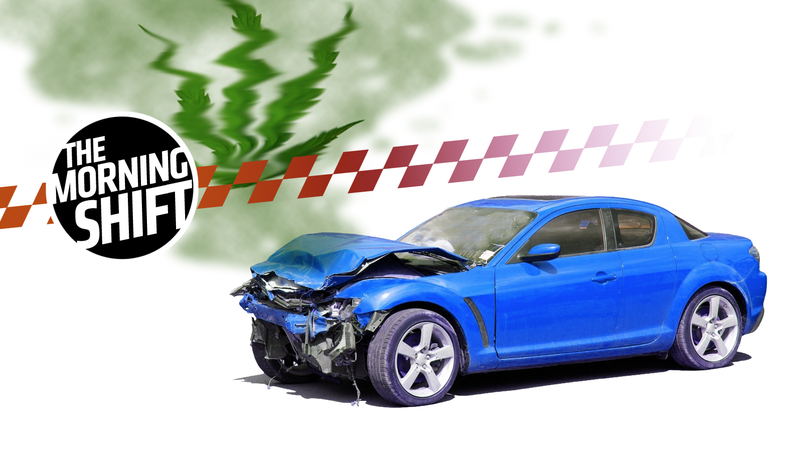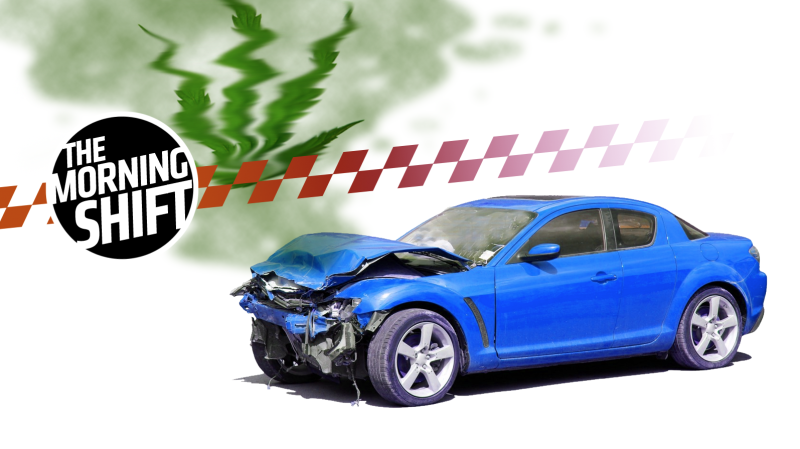
 The Morning ShiftAll your daily car news in one convenient place. Isn’t your time more important?
The Morning ShiftAll your daily car news in one convenient place. Isn’t your time more important? A new study implying that legalizing marijuana could cause more car crashes, more news on Hyundai and Kia fire reports, VW’s boss says the future of Germany’s auto industry could be bleak, and much more. This is The Morning Shift for October 18, 2018.
1st Gear: States Where Marijuana Is Legal Are Experiencing More Car Crashes: IIHS
The Insurance Institute for Highway Safety just released information on a study stating that legalizing recreational marijuana could lead to an increase in car crashes. This is based on research looking at crash statistics in Colorado, Nevada, Oregon and Washington, and comparing it to data from neighboring states. The findings: crash frequency from the aforementioned states where pot is legal is up 6 percent compared to neighboring states where recreational use of pot remains outlawed.
Advertisement
IIHS and the Highway Loss Data Institute—which are both funded by insurance corporations—were involved in the research, and will present their full studies at today’s “Combating Alcohol- and Drug-Impaired Driving summit,” which the two organizations will host at IIHS’s Vehicle Research Center in Virginia.
IIHS describes HLDI’s research, writing that the six percent figure describes the difference in the increase in frequency of collision claims per insured vehicle year compared to four “control states.”:
HLDI analysts estimate that the frequency of collision claims per insured vehicle year rose a combined 6 percent following the start of retail sales of recreational marijuana in Colorado, Nevada, Oregon and Washington, compared with the control states of Idaho, Montana, Utah and Wyoming. The combined-state analysis is based on collision loss data from January 2012 through October 2017.
Advertisement
The release goes on, saying analysts controlled for a number of factors, including: “differences in the rated driver population, insured vehicle fleet, the mix of urban versus rural exposure, unemployment, weather and seasonality.”
IIHS’s separate study dug into police-reported crashes, and came up with a similar result:
A separate IIHS study examined 2012–16 police-reported crashes before and after retail sales began in Colorado, Oregon and Washington. IIHS estimates that the three states combined saw a 5.2 percent increase in the rate of crashes per million vehicle registrations, compared with neighboring states that didn’t legalize marijuana sales.
Advertisement
The press release describes IIHS’s study further:
IIHS researchers compared the change in crash rate in Colorado, Oregon and Washington with the change in crash rates in the neighboring states that didn’t enact recreational marijuana laws. Researchers compared Colorado with Nebraska, Wyoming and Utah, and they compared Oregon and Washington with Idaho and Montana. The study controlled for differences in demographics, unemployment and weather in each state.
IIHS’s press release admits that the models used in the study cannot account for differences in marijuana laws like daily purchase limits and sales tax. And it also admits that the link between marijuana and crashes is a bit fuzzy:
Marijuana’s role in crashes isn’t as clear as the link between alcohol and crashes. Many states don’t include consistent information on driver drug use in crash reports, and policies and procedures for drug testing are inconsistent. More drivers in crashes are tested for alcohol than for drugs. When drivers are tested, other drugs are often found in combination with alcohol, which makes it difficult to isolate their separate effects.
Advertisement
Still, based on these new studies, IIHS-HLDI president David Harkey offers caution to states considering legalizing marijuana. “The new IIHS-HLDI research on marijuana and crashes indicates that legalizing marijuana for all uses is having a negative impact on the safety of our roads,” he says in the release. “States exploring legalizing marijuana should consider this effect on highway safety.”
2nd Gear: U.S. Senate Panel Wants to Talk with Hyundai and Kia About Those Fire Reports
We learned last week that the non-profit Center of Auto Safety is calling upon Hyundai and Kia to recall nearly 3 million cars after roughly 220 complaints about non-collision fires had allegedly been submitted to the center and to NHTSA.
Advertisement
Now, Reuters reports that the Senate Commerce Committee’s republican chairman and a ranking democrat say they’ve asked Hyundai and Kia execs to testify about vehicle fire reports at a Nov. 14 hearing.
The news site quotes the committee’s top democrat, Bill Nelson, who said in a statement on Wednesday:
“We’ve got to get to the bottom of what’s causing these fires…Car owners need to know if their vehicles are safe.”
Advertisement
The article goes on to describe the letter to the two automakers, which John Thune, the chair of the committee, reportedly signed. That letter describes the purpose of the hearing, with Reuters writing:
….the hearing will also “examine efforts to mitigate vehicle fires and promptly identify and respond to defects that may pose a fire risk” and invites the chief executives of Hyundai and Kia’s U.S. units to testify or their designee.
The Reuters story includes no comment from Kia, but Hyundai told the news site that the brand “is currently reviewing [the request to appear]” and that Hyundai “actively monitors and evaluates potential safety concerns, including non-collision fires, with all of its vehicles and acts swiftly to recall any vehicles with safety-related defects.”
Advertisement
It’s also worth mentioning the response Jalopnik received for last week’s story on the Center for Auto Safety’s demand that Hyundai and Kia recall an additional 2.9 million cars:
…a spokesperson for Hyundai Motor America told Jalopnik the root of this issue has already been addressed and recalled. The “only defect trend causing non-collision fires,” the spokesperson said, is one Hyundai has already identified in two previous recalls: a 2015 recall on Sonatas from the 2011 and 2012 model years, and a 2017 recall on 2013 to 2014 Sonatas and Santa Fe Sports for similar issues.
3rd Gear: Volkswagen’s CEO Thinks The Prosperity of the German Auto Industry Is in Jeopardy
At a suppliers’ conference on Volkswagen’s home turf in Wolfsburg, Germany, the company’s CEO, Herbert Diess, cautioned that changes in supply chains and new emissions regulations could jeopardize the prosperity of the German auto industry, with Reuters quoting Diess as having said:
“If you look at the former bastions of the auto industry like Detroit, Oxford-Cowley or Turin, you understand what happens to cities when once-powerful corporations and leading industries falter.”
Advertisement
The news site says Diess thinks that the pace of new regulations pushing for a shift to EVs, as well as “new geopolitical threats,” could send some automakers out of business. Here’s a rather gloomy quote from the VW boss:
“From today’s point of view the chances are perhaps 50-50 that the German auto industry will still belong among the global elite in 10 years’ time,” he said, referring to leading players Volkswagen Group, BMW (BMWG.DE) and Daimler (DAIGn.DE).
Here’s an even gloomier one:
“We are all used to the fact that we have flourishing industrial metropolises around the central manufacturing plants of German carmakers and their suppliers, places where people like to live and work, but that’s not guaranteed for eternity,” Diess said.
Advertisement
He also reportedly said that transitioning from internal combustion engines to EVs would cost VW 14,000 jobs by 2020, with Reuters saying job loss could be attributed to how much quicker it is to build an EV compared to a conventional car (due in part to the former’s motor’s simplicity), and also the fact that car companies will send more jobs overseas as they buy parts from battery suppliers.
Here’s another grim quote from Diess:
“It is clear to us all that the structural shift will lead to fewer auto industry jobs in Germany. The question is, how quickly do we need to implement this structural change?,” he said.
Advertisement
4th Gear: Ford and Mahindra Are Teaming Up on Powertrains and Connected Car Tech
Ford Motor Company announced yesterday that it and Mahindra are partners for the long-haul, particularly when it comes to sharing powertrains and developing “connected car solutions,” with The Blue Oval brand writing:
Under the definitive agreement on powertrain sharing, Mahindra Group will develop and supply a low-displacement petrol engine to Ford India for use in its present and future vehicles, starting in 2020. The BS-VI compliant powertrain will help Ford extend and strengthen its existing offering of petrol engines, that currently includes the all-new 3-cylinder TiVCT family.
Building on their intent to co-develop a suite of connected car solutions, Mahindra and Ford also announced joint development of a telematics control unit. Once developed, the connected vehicle solution will be deployed across both Mahindra and Ford vehicles.
Advertisement
Ford says its goal is to “generate synergies” with Mahindra by combining Ford’s “global reach and expertise” with “Mahindra’s scale in India and its successful operating model.”
And indeed, Mahindra has quite some scale in India, with Ford saying the company has led the “utility vehicles” segment in the nation for the past seven decades. Ford also touts Mahindra’s EV offerings and its majority state in Korean auto company Ssangyong.
5th Gear: VW Agrees on Incentives to Get People to Trade in Old Polluting Diesels
A number of cities in Germany are threatening driving bans, and VW has plans to try to prevent those from happening—namely, the company will give incentives to customers who agree to scrap euro 1 and euro 4 emissions-level diesel cars, with Reuters writing:
Volkswagen (VOWG_p.DE) on Thursday said it will offer trade-in incentives and a bonus for scrapping older diesel vehicles in Germany, in a move to stave off driving bans in polluted cities.
Advertisement
Germany’s auto industry is going through changes. That much is clear.
Reverse: Buckminster Fuller Applies For Patent For His Amazing Dymaxion Car
Via History:
On October 18, 1933, the American philosopher-inventor R. Buckminster Fuller applies for a patent for his Dymaxion Car…It was a three-wheeled, 20-foot-long, pod-shaped automobile that could carry 11 passengers and travel as fast as 120 miles per hour. It got 30 miles to the gallon, could U-turn in a distance equal to its length and could parallel park just by pivoting its wheels toward the curb and zipping sideways into its parking space.
Advertisement
Neutral: What Do You Make of IIHS’s Study Linking Pot Legalization and Decreased Highway Safety?
We don’t have the full detailed study to look at, but what do you make of what’s presented in IIHS’s press release?















